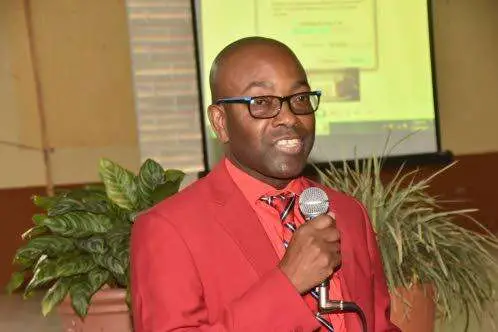
Crime — Blame it on the education system?
We are going through exciting times; an era that requires discussion and less quarrel. Interesting things are happening in the world and in the region. This is so, especially for Jamaica with the recent visit of the US secretary of state. This visit was reminiscent of that of one his earlier counterparts to Jamaica in 1976.
It is also interesting to observe the current tension between the Minister of National Security Horace Chang and Owen Speid, president of the Jamaica Teachers’ Association (JTA). According to ‘Wrong message’ ( Jamaica Observer, January, 22) headline, ‘JTA head rejects Chang’s claim; says boys not marginalised’. This charge was directed to Chang, who had called for a STEM (science, technology, engineering, and mathematics) school to be built in St James. The Observer January 15 article (‘STEM school for boys to be built in St James, says Chang’) quotes the minister, who, in the euphoria of whipping up a loyalty arousal-type speech, made a cardinal error in charging that the level of crime among young, black males is a result of the fact that the education system in Jamaica is biased against them. “The entire system is designed to put them at the bottom of the socio-economic ladder. That’s the education system we inherited and we have not done enough to change it,” Chang argued. He suggested that the system is tailored to suppress black males; hence, the persistence of crime and violence among that gender group. He offered the STEM school to treat the problem.
It is a strange way to embrace black nationalism in party politics. Speid, in his stern teacher-like and correct approach, said no to the minister and rejected the notion that the system was biased against black boys. He posited that what is needed is an overhaul of the entire system of education. He enlightened the minister that the system was biased against both black males and black females, and noted that the minister’s utterances could have a negative effect of guiding young males to give up early because the system is designed against them.
Speid is correct about the system, but Chang is not entirely wrong in correlating low educational achievement and high level of crime.
Of course, this information in not new, but it is useful in widening the narrative in the fight against crime, among other factors, such as the way in which the society is organised.
A brief review of male underachievement in Jamaica will show that females had been surging ahead of males in educational achievement during the decades of the 1970s. This concern was covered in the book Men at Risk by Professor Errol Miller in the following decade.
One newspaper columnist, circa 2015/2017, in responding to views that lotto scammers were not illiterate individuals, and that many students in western Jamaica rejected the nature of the existing vocational training system, called for a 21st century curriculum inclusive of applied sciences to attract young people into education and training. Another columnist, an economist, during the same period, urged for a “revolution in education” in order to develop the intelligent citizen, a competitive workforce, and also to confront the problem of crime in Jamaica.
Some cross cultural studies in the early 1990s explored the role of the new value system brought on by globalisation, marketisation, the age of high consumerism, the impact of mass culture, and new forms of technological devices such as electronic games with emphasis on those games specially designed for boys and their negative influence on youth and education. These observations, combined with the harmful and damaging effect of movies and popular culture on children, must be incorporated as new features in the debate on the system of education and crime in Jamaica, and also in matters concerning wayward boys on the fringes of high achievement in education.
On the side of history, during the 1865 era, one Baptist missionary openly blamed the colonial Government for deliberately keeping the masses illiterate, and that the low level of illiteracy was associated with the high level of imprisonment in Jamaica. The historical view shows also that poor education is associated with high occurrence of crime; of course, poor education is one of the factors of this complex occurrence.
Regarding the idea of STEM applied by the minister of national security, we should not pin all the blame on him for the misapplication of the concept of science education in arresting male delinquency. This STEM idea has been around in Jamaica from 2014 to 2015 era and was resurrected recently by Prime Minister Andrew Holness with a plan for this STEM revolution to be led by selected members of the private sector. There is no clarity on this idea and how it will be transplanted in a condition not having the nutrients to sustain the plant.
Like many others people, Chang is misled on the purpose of STEM in the same manner people were left in the dark about the Primary Exit Profile (PEP). The idea of having a science-reformed curriculum is a great thing. I welcome it. But it has to be grounded in the history, culture, and purpose of education in Jamaica.
What I mean is this: The areas of the world from which the science, technology, engineering and mathematics (STEM) model is imported have all the qualities in their society, family, and school system that nourish and sustain the teaching and learning of mathematics and the sciences. The matter of science education is complex and it must not be one of those political legacy projects that serve to continue a “pitchy-patchy” approach in the attempt to transform the system of education. The process must be led by research educators, scientists and practitioners. It must be also accompanied by a programme of scientific literacy.
The idea regarding the system of education and its association with crime, and the response by Speid that the entire system must be overhauled, are views that the STEM advocates should explore. There is also implication that the discussion for change must begin with philosophy that informs the system of education and those who understand the issue should lead. This approach must be combined with research on the barriers to high achievement in education and also those roadblocks in the teaching and learning of mathematics and the sciences. It is not an impossible task to employ science in community projects to inspire “creative resistance” among the youth.
Speid was also correct in objecting that the STEM institution is not the right approach to deal with indiscipline boys — again, there are girls who have the same behaviour problems as boys. What is needed to combat this scourge is the building of some military secondary institutions across the country to deal with this problem of violence and indiscipline behaviour in our schools. The issue of the presence of authority and discipline are dominant qualities of military organisation and, most important, in the process of teaching and learning. This kind of institution may be informed by academic and vocational areas with an emphasis of science in the latter areas of study. In fact, the history of West Point and Annapolis began as humble vocational centres with the purpose of taking sciences to the everyday-lived experience.
In the history of the development of nations through the application of the sciences, it is observed that the military played an important role in this process of science and national development. It is my thinking that Chang needs for his constituency a military training institution to assist in treating the increasing array of young people that have passed through the revolving school doors before they graduate into a life of crime.
Jamaicans are eagerly awaiting the minister of national security to put in place appropriate solutions to deal with these young guns and fearless criminals. It is my hope that Speid and his organisation will continue this brave struggle for an overhaul of the entire educational system, writing a new page in the history of education and Jamaica. The time has long come.
Louis E A Moyston, PhD, is a university lecturer. Send comments to the Observer or thearchives01@yahoo.com.


























